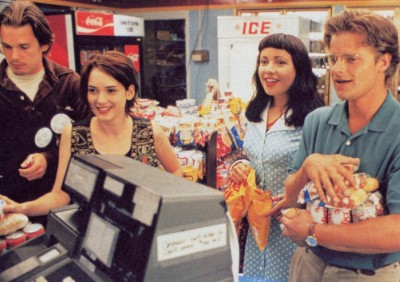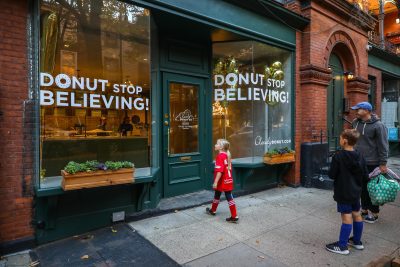Just How Screwed Are Brooklyn’s Millennials?
If I described a group of people in their early 20s, at least one with questionable facial hair and one with great bangs, all college graduates, working at jobs where they are underpaid or underutilized (or both), or not working at all, who sometimes use a parent’s credit card to buy both essential and non-essential things, would those people sound familiar to you? Would you be all, “Oh, of course, those are the characters in seminal 90s movie ‘Reality Bites’?” Well, no. That’s not who I’m describing at all. And you probably only thought that because you are either old (the 90s was a really long time ago), or because you think everything is a pop culture reference, which is, surprisingly, not always the case. In fact, though, I am describing people who you probably already know because you’re probably already one of them. I am describing Brooklyn’s millennials. And it’s a group that, as a whole, might just be totally screwed.
In a New York Times article titled “Do Millennials Stand a Chance in the Real World?”, Annie Lowrey—who herself belongs to the millennial generation—discusses whether or not all the people born between roughly 1980-1990 are going to have any chance of achieving the material success of the generations that came before them: “For the first time in modern memory, a whole generation might not prove wealthier than the one that preceded it.” Lowrey’s premise is depressingly familiar both as one that has been acknowledged before in the media and also anecdotally, as in, we all totally know lots of people in their twenties who are struggling. The article is an acknowledgment of the fact that millennials bear the burden of not only entering a job market during an economic recession, but also of having their generation’s most valuable asset—a surplus of advanced degrees—usually carrying a staggering amount of debt in the form of student loans along with, you know, academic prestige. So, now, when millennials think about achieving the American Dream of owning a home and being able to save for retirement, they quickly realize that it might not be possible, no matter how hard they work and how much they try to save. So, that all pretty much sucks, doesn’t it? Yes. It does.
One way that this dire economic situation has manifested itself is that members of the millennial generation “have developed a reputation for a certain materialism.” Lowrey cites “a Pew Research Center survey in which different generations were asked what made them unique, baby boomers responded with qualities like ‘work ethic’; millennials offered ‘clothes.’” While it is possible that this focus on a material-based identity is a product of a preoccupation based on the fact that millennials can’t even afford some of the most standard social status symbols (a car, cable TV, etc.) there are other troubling societal elements at play. Lowrey references the generation of Americans, including her grandmother, who came of age during the Great Depression and carried their thrifty habits with them throughout their lives. Lowrey notes that this generation is “one that saved rather than spent, preserved rather than squandered.” So true. My own grandmother used to use the same paper towel over and over again until it developed holes. She would roll her eyes at me when I would throw one out that had only been used to wipe up spilled water and she would ignore my protests that paper towels literally grew on trees (I was a jerk as a kid too) before fishing it out of the garbage, folding it, and placing it by the kitchen sink to use again. So, yeah, that generation knew how to save things.


But what about the millennials? Lowrey feels that because we have “adapted to our once-in-a-lifetime financial crisis — the one that battered career prospects, drove hundreds of thousands into the shelter of schools or parents’ basements and left hundreds of thousands of others in continual underemployment… we, too, have developed our own Depression-era fixation with money.” Studies have shown that although millennials aren’t making a lot of money, they also aren’t spending a lot. And, in fact, we have less credit card debt than preceding generations, although this might not be because millennials have such great self-control, rather it is because it’s harder to get credit cards now. That said, I find it hard to believe that a generation that grew up amid a constant assault of advertising and brand worship, one that actively judges people based on the clothes they wear and the phones they use and the computers they work on, is quietly going to give up on all the things that it was promised, things to which it feels entitled.
What is especially galling to those of us who grew up thinking that, if we worked hard and went to school and followed a certain path we were promised, if not riches, at least comfort, is the glaring truth that while financial stability might never be available for many of us, there is a percentage of society that has a bigger cushion than just about anyone else has ever had in history. What percent is that? Oh, right. It’s the 1 percent. Lowrey acknowledges that while it was possible for the generation that came of age during the Great Depression to feel like they were all struggling together, millennials are faced with the fact that “income inequality has yawned to levels not seen since the late 1920s. And since the worst days of the recession ended, inequality has continued to grow. Corporations that shed workers became leaner and more profitable. Members of the 1 percent have taken nearly all the wage gains made in the recovery. Their incomes bounced back. Nearly everyone else’s fell.” Oh. So that’s cool.
Perhaps unsurprisingly, the economists that Lowrey talks to are pessimistic about the millennials ability to recover from the wage stagnation, which has been coupled with current inflated costs of living, and doubt that there is much to do about turning what has always been seen as an “income gap” into a “wealth gap.” The difference between an income gap and a wealth gap is simply that, in the past, even someone with a modestly paying job could hope to retire with savings and perhaps a pension, but not anymore! Now, that type of security seems next to impossible for those of us who finish our twenties with nothing in savings and no investments except for a dusty box of Beanie Babies in our parents’ attic. Beanie Babies, of course, being “another economic lie” that was fed to us in our youths, according to Virginia Smith.
But how do most millennials feel about their precarious future? Apparently, they “remain optimistic.” Which, really, is the best way to be. Well, optimistic and angry. Or at least, that’s my favorite way to be because optimism and anger are actually pretty good motivators. And one of the things which separates millennials from their “Reality Bites” predecessors in Generation X, is that millennials are not known for being slackers. Lowrey mentions that “millennials are the best-educated generation ever,” which can never be a bad thing. Well, other than those crippling student loans, but what can you do about those, really. Millennials also have shown a remarkable ability to organize and affect change in a political and social realm and are quick to adapt and to innovate. Perhaps this generation is better suited than any other one in recent history to tear down an American Dream that is based on profligacy and grotesque consumption and rebuild it in their own image, one that is equitable and sustainable and secure. I mean, sure, the millennial American Dream will be outfitted with Apple products, but we can’t give up on everything nice, can we?
Follow Kristin Iversen on twitter @kmiversen
You might also like 





















